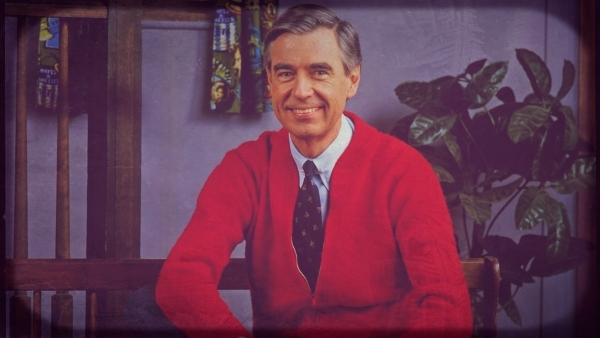Television can be a force for positive change, as can the movies. Recently, at the Latchis Theatre, my son, Hayden, and I saw the new documentary about Fred Rogers - or, as we all know him, Mister Rogers - titled Won't You Be My Neighbor? after the famous song he always sang at the beginning of his renowned PBS television show Mister Rogers' Neighborhood.
This film is powerful. It's poignant. And it's profound.
Mister Rogers was a rarity then, and he's a rarity now. I can't think of anyone else, aside from my family, who says things to me such as, “I believe in you,” “I love you just the way you are,” and “You are capable of loving.”
Through the key themes of his show - kindness, trust, and unconditional love - Mister Rogers made you feel that you were special in the world. He had the power to communicate through television that we are wholesome people, no matter our limitations.
* * *
I don't see many people teaching us the core values that made Mister Rogers' Neighborhood such a wonderful place.
Tragically, children, especially boys, are socialized to forget everything that Mister Rogers taught us.
I experienced this in my early years in elementary school. Boys would tease other boys who watched Mister Rogers. “You like Mister Rogers,” they would taunt.
In my later elementary years, those phrases turned to “Mister Rogers is a fag!” “Mister Rogers is a homo,” or “Mister Rogers is a pervert wearing a cardigan.” Students would ridicule Mister Rogers' themes of kindness, love, caring, and expressing one's vulnerability, rejecting those values with bullying, taunting, demonstration of physical strength, and proudly not showing one's emotions.
I'm know I'm not the only youngster who found Mister Rogers' lessons destroyed in school. This was the norm, not the exception.
* * *
The television show faded from existence and ended in 2001, but Mister Rogers is important again. I think it's because many of us yearn for a society that values kindness, compassion, understanding, and love. These are harder to find now.
Look at the political climate today, especially the words and actions of our current president of the United States, Donald Trump.
Every day, Trump tweets out caustic put-downs of anyone who disagrees with him - the media or America's allies. His words are downright bullying. His supporters carry that bullying out on immigrants, the media, or anyone other than white.
It's scary to think where we're headed as a country. But I always think good prevails in the end.
I won't spoil the film, but I want to share about a scene that hit an emotional bull's-eye. Daniel the Tiger, one of the show's puppets, sings to Lady Aberlin, one of the show's human characters, that he's a mistake.
The song was powerful: “Often I wonder if I'm a mistake/I'm not supposed to be scared, am I/Sometimes I cry and sometimes I shake/Wondering isn't it true that the strong never break/I'm not like anyone else I know.”
Lady Aberlin sings to Daniel, assuring him he's just fine: “I think you are just fine as you are/I really must tell you/I do like the person that you are becoming.”
“When you are sleeping/When you are waking/You're not a fake/You're no mistake/You are my friend.”
* * *
The song Daniel sang was a reflection of Fred Rogers' life growing up. I also realized that this was a reflection of my own life as well.
I felt like I was a mistake. I went to a very challenging high school where I struggled academically. I thought all of my classmates were smarter and more athletic, and they were more respected for those qualities. I had feelings for girls, but it always felt like I was not attractive to them.
I always kept asking myself, “What's wrong with me?” That belief pattern has stayed with me throughout my life. Why didn't I excel in college? Why didn't I get a good-paying job out of college? Why was I turned down for so many jobs? And why did I not love and respect my ex-wife more?
Mister Rogers wants us to believe that we're not just human, but worthy of love and giving love to others.
He really believed love was at the root of one's self-worth and no matter how far down the scale we have gone, we're still great people.
* * *
The movie Won't You Be My Neighbor? moves you to want to be a better person - and inspires you to realize that you are capable of it.
It's been two weeks since I saw the film, and I'm still crying. Driving back to work from my favorite burrito joint today, I sobbed in the car. Later, I was crying in the grocery store. Writing these words is also making me cry.
I'm sure I'll cry many more tears as the week progresses, because that's how much of an impact it had on me.
Mister Rogers showed that kindness, human decency, and an unabiding love for young people (and one's self) are true acts of political courage. He makes me want to be a better parent, a better human, a person who is self-forgiving and a person who can accept love of self.
Sometimes revolutionary change comes from genuine kindness and love. Who knew that could be revolutionary, especially to one's self?
I can identify with that now. For the first time in a long time, I'm happy with who I am. I still have a long ways to go. But I am more at peace with myself. That's how I felt after I left the movie with my son.
Won't You Be My Neighbor? was honest and empathetic, like Fred Rogers himself. There are Mister Rogers all around us. Show yourselves. Be more like Fred.
